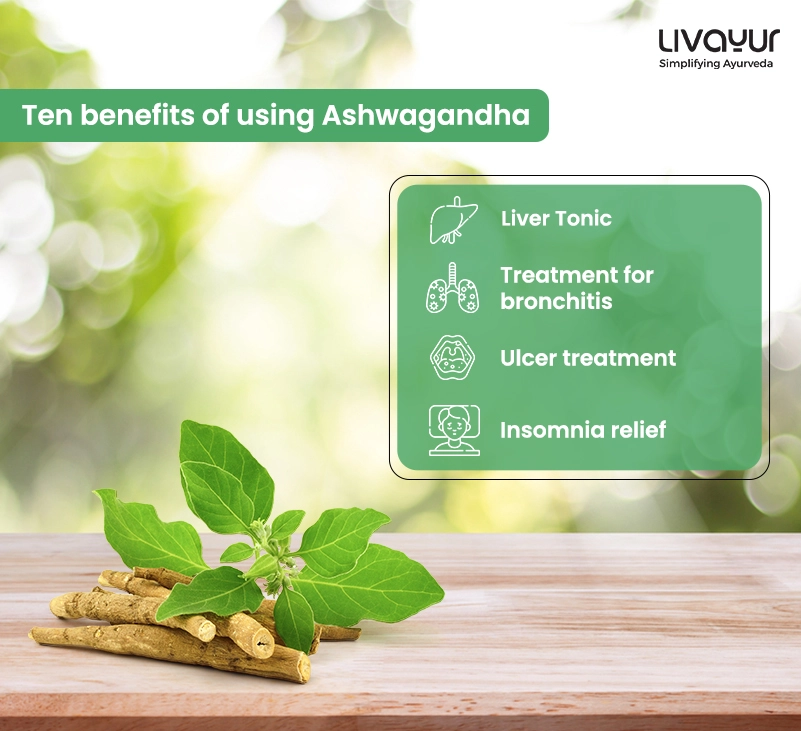
Ashwagandha is a potent herb celebrated for its varied contributions to optimal well-being in Ayurveda. Rooted in the Sanskrit language, Ashwagandha translates to “smell of the horse” because of the herb’s ability to impart the vitality of a stallion.
This article explores the ten proven health benefits of Ashwagandha. We will uncover its therapeutic potential through a conventional Ayurvedic medicinal system. So, let’s look at ways Ashwagandha can enhance your well-being.
Quick facts about Ashwagandha
- Ashwagandha has socio-economic utility, as you can effortlessly cultivate it in home lawns. [1]
- Recognized as a potent regenerative tonic, Ashwagandha holds a distinguished place among Ayurvedic rasayana herbs. [2]
- Referred to as the “Sattvic Kapha Rasayana” herb in Ayurveda, it plays a vital role in holistic well-being. [2]
- Scientifically classified as Withania somnifera, belonging to the Solanaceae family, Ashwagandha is colloquially known as “Indian Winter Cherry” or “Indian Ginseng.” [2]
What is Ashwagandha?
Ashwagandha, scientifically classified as Withania somnifera, belongs to the Solanaceae family. This herb holds a crucial position in Ayurveda, the traditional system of medicine in India, where it has been used for years as a Rasayana.
Rasayana is a term within Ayurvedic philosophy that denotes an herbal or metallic preparation acknowledged for enabling a youthful state of physical and mental health. Ashwagandha’s significance in Ayurveda is a testimony to its wide-ranging therapeutic properties. [2]
Ten benefits of using Ashwagandha
Here are the ten benefits of using Ashwagandha.
1. Aphrodisiac properties
Ashwagandha has aphrodisiac qualities that contribute to enhanced vitality and reproductive health. [3]
2. Liver tonic
As a potent liver tonic, Ashwagandha supports liver health by promoting detoxification and optimal functioning. [3]
3. Anti-inflammatory agent
With its anti-inflammatory properties, Ashwagandha is crucial in mitigating inflammation and supporting immune function. [3]
4. Astringent effect
Ashwagandha exhibits astringent characteristics, aiding in the contraction of tissues and contributing to a balanced physiological state. [3]
5. Treatment for bronchitis
Ashwagandha is traditionally used to address bronchitis, providing relief from respiratory distress. [3]
6. Management of asthma
The herb has the potential to manage asthma symptoms, offering respiratory support. [3]
7. Ulcer treatment
Ashwagandha has gastroprotective properties, making it valuable in addressing ulcers and promoting digestive wellness. [3]
8. Insomnia relief
With its calming attributes, Ashwagandha aids in managing insomnia, facilitating restfulness, and improving sleep. [3]
9. Anxiety and cognitive disorders
Ashwagandha demonstrates efficacy in overcoming anxiety and addressing cognitive disorders, contributing to mental well-being. [3]
10. Neurological support in Parkinson’s disease
Owing to its neuroprotective properties, Ashwagandha shows promise in supporting individuals with Parkinson’s disease. [3]
How to consume Ashwagandha
Here are some ways to consume this versatile herb.
1. Powder form
Ashwagandha is commonly available in powder form, making blending into tea or warm water easy. Start with a small dose and gradually increase as per individual tolerance.
2. Capsules or tablets
For those seeking a convenient and precise dosage, Ashwagandha is available in capsule or tablet form. It ensures standardized intake and is suitable for those with busy lifestyles.
3. Tinctures
Tinctures, extracted in alcohol or glycerin, offer a concentrated form of Ashwagandha. Add them to beverages or take them directly for a potent and quickly absorbed option.
4. Traditional ayurvedic recipes
You can incorporate Ashwagandha into traditional Ayurvedic recipes, like herbal tonics or decoctions. Ayurvedic practitioners may recommend specific formulations tailored to individual needs.
5. Oil infusions
Some individuals prefer to consume Ashwagandha as an oil infusion. It involves soaking the herb in a carrier oil, creating an infused oil that you can add to food or apply topically.
6. Combination with milk (Ashwagandha milk)
Mixing Ashwagandha powder with warm milk is a classic Ayurvedic approach. It enhances the herb’s absorption and creates a soothing bedtime beverage.
Side effects of Ashwagandha
While Ashwagandha is generally well-tolerated, it is essential to be aware of potential side effects.
1. Gastrointestinal distress
In some cases, there can be mild gastrointestinal discomfort, like nausea or upset stomach, especially when taking Ashwagandha in high doses.
2. Allergic reactions
Allergic reactions to Ashwagandha are rare but can occur. Individuals with known sensitivities to Solanaceae family plants, including tomatoes and bell peppers, should exercise caution.
3. Interactions with medications
Ashwagandha may interact with medications, like immunosuppressants or sedatives. It is best to contact a healthcare professional before incorporating Ashwagandha into the routine.
4. Sedative effects
Ashwagandha possesses mild soothing properties, which may lead to drowsiness. Individuals taking medications that cause drowsiness should exercise caution.
5. Hypotension
Ashwagandha has potential blood pressure-lowering effects. Individuals with low blood pressure should monitor their levels and contact a healthcare provider before regular use.
Precautions to keep in mind about Ashwagandha
While Ashwagandha has diverse health benefits, exercising caution and considering the following precautions is crucial to ensure its effective use.
1. Dosage awareness
Adhere to recommended dosage guidelines to prevent potential side effects. Excessive consumption may cause gastrointestinal discomfort or other adverse reactions.
2. Individual variability
Individual responses to Ashwagandha can vary. It is crucial to monitor personal reactions and consult a healthcare professional if unexpected symptoms arise.
3. Pregnancy and breastfeeding
Pregnant and breastfeeding individuals should seek guidance from a healthcare professional before incorporating Ashwagandha into their routine.
4. Autoimmune conditions
Ashwagandha may stimulate the immune system. Those with autoimmune conditions should consult with a healthcare provider before use.
5. Consultation with healthcare professionals
Before using Ashwagandha, consulting with a qualified healthcare professional is suitable, especially for individuals with underlying health conditions.
FAQs
1. Is it good to take Ashwagandha every day?
Yes, for many individuals, taking Ashwagandha daily is safe and beneficial. Consistent use is suitable to experience the herb’s cumulative effects on overall well-being. However, following recommended dosage guidelines and consulting with a healthcare professional is crucial, especially for those with pre-existing health conditions.
2. Can I take Ashwagandha at night?
Yes, Ashwagandha is often taken at night due to its mild sedative properties. Consuming it before bedtime promotes relaxation and supports better sleep. However, individual responses can vary, and some people may find it more suitable at other times of the day. Experimentation with timing is advisable to determine what works best for each individual.
3. How much Ashwagandha per day should I take?
The optimal daily dosage of Ashwagandha can vary based on age, health status, and individual tolerance. Generally, a recommended dose ranges from 300-600 mg per day, divided into two or three servings. It is advisable to begin with a limited dose and increase it gradually while monitoring the personal response. Consulting with a doctor can provide personalized guidance.
4. What is the best time to take Ashwagandha?
The best time to take Ashwagandha depends on individual preferences and goals. As it possesses mild sedative properties, taking it in the evening or before bedtime may promote relaxation and improve sleep. Personal experimentation and consultation with a healthcare professional can help determine the ideal timing.
5. Which Ashwagandha is best?
Choosing the best Ashwagandha depends on individual needs and preferences. Various forms are available, including powders, capsules, and tinctures. Opt for reputable brands that provide high-quality, organically sourced Ashwagandha. Additionally, considering the specific health goals, like stress relief or immune support, can guide the selection of the most suitable form.
6. Is Ashwagandha 100% safe?
While Ashwagandha is generally safe when taken within recommended dosages, it may not suit everyone. Some individuals may experience mild side effects, which may interact with certain medications. Pregnant or breastfeeding individuals and those with specific health conditions must contact a healthcare professional before using Ashwagandha.
Conclusion
The ancient wisdom of Ayurveda has given the remarkable herb Ashwagandha. It offers proven health benefits for physical, mental, and emotional well-being. From its aphrodisiac properties to its role as a liver tonic, Ashwagandha is an invaluable component of holistic healthcare. As we navigate the complexities of modern life, Ashwagandha can be an ideal connection between ancient traditions and everyday well-being. Embracing Ashwagandha will only help you reap its numerous benefits.
Disclaimer
This article is written from a health and wellness perspective and is not medical advice. Kindly seek the help of a certified medical practitioner before initiating any treatment or dietary modification.

















3 Comments